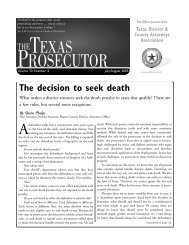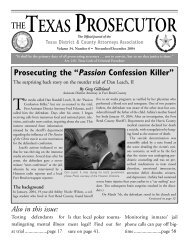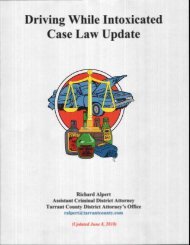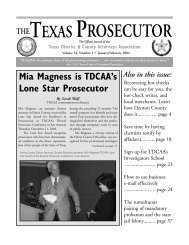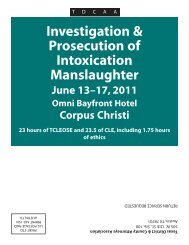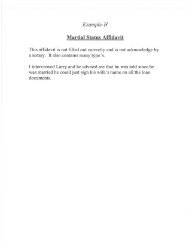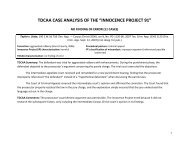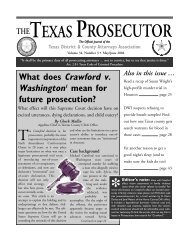Driving While Intoxicated Case Law Update - Texas District ...
Driving While Intoxicated Case Law Update - Texas District ...
Driving While Intoxicated Case Law Update - Texas District ...
Create successful ePaper yourself
Turn your PDF publications into a flip-book with our unique Google optimized e-Paper software.
from the implied consent statute. This finding-that the evidence did not establish whether<br />
defendant could or could not read the Spanish DIC-24 form*required the trial court to ovenule the<br />
defendant's motion fo suppress.<br />
6. INSUFFICIENT EVIDENCE OF CAUSAL CONNECTION BETWEEN<br />
OFFICER STATEMENT AND CONSENT<br />
Berqner v. State, 2008 WL 4779592 (Tex.App.-Fort Worth 2008, no pet.).<br />
ln this appeal the defendant claimed that her breath fesf resu/f should have been suppressed<br />
because of officer's statement regarding consequences of refusal. The defendant when asked for<br />
a sample after the warnings were read, sard She would give a sample. <strong>While</strong> officer was out of the<br />
room, she called a friend on her cell, and he told her to refuse. When she asked officer what would<br />
happen if she refused, he told her that she would go to jail if she did not blow. <strong>While</strong> conceding<br />
that the officer's statement was of the type that resulted in suppressio n in Erdman. the Court found<br />
that there was no causal connection between the statement and the refusal. Upon cross<br />
examination the defendant admifted she already knew that she would go to jail if she refused so<br />
the officer's statement could not have caused the "psychological pressures" that Erdman and the<br />
cases that followed were designed to prevent.<br />
J. BREATH TEST FOUND TO BE COERCED<br />
State v. Serano, 894 S.W.2d 74 (Tex.App.-Houston [14th Dist] 1995, no pet.)<br />
Where officer told defendant if he passed the breath fesf he would be released, and if he failed it<br />
he would be arrested while defendant was at scene, said statement was coercive even though fitrto<br />
hours passed from time of the statement to time of breath test and even though another officer<br />
properly admonished defendant prior to the samp/eb being given.<br />
Erdman v. State, 861 S.W.2d 890 (Tex.Crim.App. 1993).<br />
Officer's incorrectly informing defendant of consequences of refusalto give breath sample will not<br />
always = evidence that consent was coerced. Quesfibn of voluntariness rs a case-by-case<br />
question of fact. Court concluded under these facts that officer stating to defendant "if he took the<br />
test and passedhe would be released, but if he refused he would be charged with DWl" constituted<br />
coercion.<br />
State v. Sells, 798 S.W.2d 865 (Tex.App.-Austin 1990, no pet.).<br />
Motorist's consent to breath test was not voluntary due to officer's statement that defendant "would<br />
automatically be charged and incarcerated" if he refused.<br />
'1 R



